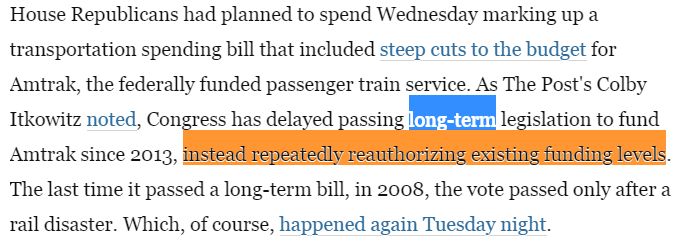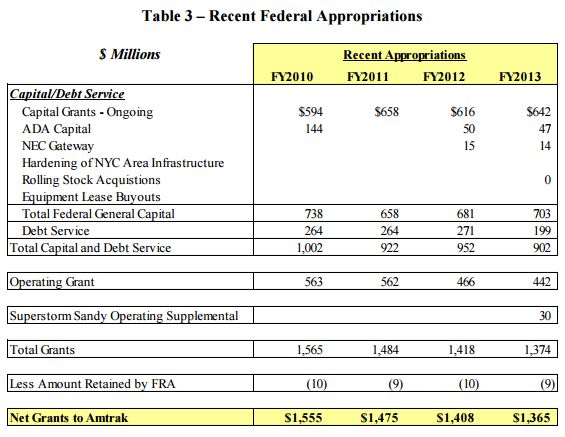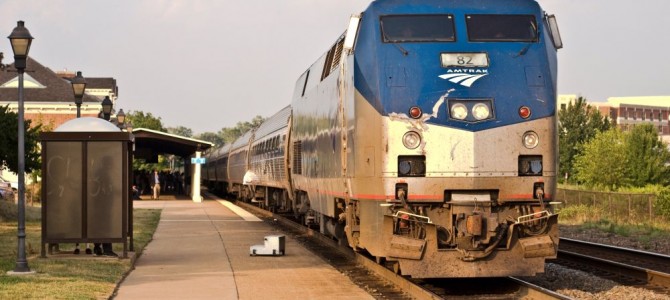“Why is funding Amtrak such a struggle?” the headline of a new Washington Post story by Philip Bump blares. “Because Republican districts don’t use it.”
Liberal ideologues and their friends and co-conspirators in the media have decided that yesterday’s tragic Amtrak crash which has killed at least seven people was the fault of Republicans. Why? Because some Republicans think that after 40 years of posting billion-dollar annual losses, it might actually be time for Amtrak to live up to its statutory charter as a for-profit corporation.
That’s the leftist line, anyway:
As The Post’s Colby Itkowitz noted, Congress has delayed passing legislation to fund Amtrak since 2013. The last time it did so, in 2008, the vote passed only after a rail disaster. Which, of course, happened again Tuesday night.
The constant struggle of Amtrak to get funding derives largely from the fact that not very many Americans use the rail system. Ridership is heavily centered in the Northeast, in the corridor between Boston and Washington where Tuesday’s accident occurred. But more than that, ridership is unevenly distributed politically. Data from the National Association of Railroad Passengers shows the number of passengers that get on or off the train in any given congressional district, and reveals an obvious reason why Republicans might not be too concerned about funding the system.
“[C]onstant struggle?” Really?
Amtrak has received over $30 billion in cash payments from federal taxpayers since it was created in 1970. If that constitutes a struggle, then for the love of all that’s holy, please sign me up for the struggle. We should all be so lucky to struggle with the burden of flushing tens of billions of dollars of free money down the toilet.
The most fascinating aspect of the Washington Post‘s exercise in Amtrak fan fiction, though, is what’s missing from the story: namely any and all information whatsoever about Amtrak funding. You’d think a story with “Amtrak funding” in its headline would have some information about Amtrak funding, wouldn’t you? Well, you’d be wrong. There’s zero information about Amtrak funding in the story. Zip. Zilch. Nada. A dollar sign figure, something you’d expect to see in a story about dollars, appears exactly zero times.
And then there’s the blatantly false and deliberately deceitful claim by Philip Bump that Congress hasn’t passed any funding for Amtrak since 2013. That’s a complete lie. If Philip Bump read his own newspaper, he’d know that the $1.1 trillion spending bill signed by President Barack Obama last December included nearly $1.4 billion in funding for Amtrak.
That law provided $1.14 billion worth of capital grants to Amtrak on top of the $250 million it appropriated to the organization for operational expenses. You can read the statutory language for yourself right here on pages 588 and 589 of the law.
No wonder Bump didn’t want to include any facts about Amtrak’s actual funding situation. Those facts destroy his premise.
Now look, I get it. The Washington Post‘s Philip Bump lives in New York City, yet works for an organization headquartered in and focused on Washington, D.C. I assume that entails a certain amount of commuting back and forth, probably via Amtrak. It makes sense that Bump would enjoy the generous taxpayer subsidy that funds his personal decision to commute via rail. Everybody likes paying less for something than it actually costs. And a lot of people enjoy conspicuous moral preening. Bump, a natural multi-tasker, happens to enjoy both at the same time. I get that.
What I don’t get is the desire to blatantly and intentionally deceive, which is exactly what Bump did. He told his readers Amtrak constantly struggled to get taxpayer funding, an assertion with no basis in reality. He refused to give his readers any information about how much money Amtrak receives from federal taxpayers each year. He then told his readers Republicans hadn’t funded Amtrak since 2013, a blatant lie. In fact, they gave Amtrak nearly $1.4 billion less than five months ago.
The next time Philip Bump decides to take a ride on the progressive propaganda train, let’s hope he at least decides to take a few facts along for the ride.
[UPDATE: Rather than fessing up, admitting error, and correcting his falsehoods, Bump has apparently decided to double-down. In an edit to the piece, Bump added the following modifiers to his error-ridden declaration (noted in italics): “Congress has delayed passing long-term legislation to fund Amtrak since 2013, instead repeatedly reauthorizing existing funding levels.”

There’s one big problem, though: that modified sentence remains completely false and, once again, intentionally deceptive. Bump does deserve credit, however, for cramming so much intentional deception into so few words. That kind of ability can be acquired only through repeated practice.
First, Congress hasn’t delayed anything with regard to Amtrak funding. Amtrak, like nearly all other discretionary federal programs, receives its funding from annual appropriations bills. Amtrak, because it’s incapable of existing without massive infusions of taxpayer cash each year, has always operated this way. Each year it loses money, and each year it begs Congress, conductor hat in hand, for its billion-dollar annual allowance. Amtrak receives appropriations at the same time every other program receives appropriations. Bump’s alleged “delay” is pure fiction, as his invention of this magical (and non-existent) “long-term legislation to fund Amtrak.”
To whine about the lack of a “long-term” Amtrak funding vehicle is to suggest that it ever existed in the first place.
Second, Congress most certainly did not “repeatedly reauthorize” Amtrak funding. It appropriated it. Authorizations are merely recommendations. Despite the term, they don’t actually authorize the expenditure of funding. Only appropriations can do that. At one time, authorizations were important. They included all the different things programs could and couldn’t do. They even set caps on what a given program could receive in appropriations. Unfortunately, due to the massive expansion of the power of appropriations committees at the expense of the authorizing committees, there is no longer any meaningful connection whatsoever between recommended authorization levels and actual appropriation levels.
Finally, there’s Bump’s claim that Congress has merely “reauthoriz[ed] existing funding levels” for Amtrak. That’s also wrong. Federal appropriations for Amtrak, which Bump initially tried to tell us didn’t even exist, have most certainly not been at the same “existing” authorized level. How do we know this? Because Amtrak plainly tells us as much:

Had Bump spent five minutes looking through previous appropriations laws and Amtrak budget documents to confirm his assertion–something you would expect even the greenest of rookie journalists to do–he would’ve known that, but he didn’t.
It’s obvious to me why Bump’s article went so wrong so fast. He saw a story about how Amtrak hadn’t been reauthorized since 2008 and he assumed that meant Amtrak hadn’t received any funding since its authorization expired. Since that assumption was just too good to check, and since it aligned so perfectly with his political and ideological views, he ran with it without ever bothering to check it. Had he been aware of the distinction between appropriations and authorizations, as any reporter who reports on federal programs for a living should, he wouldn’t have made such a boneheaded error. But he didn’t.
It didn’t stop there, though. Philip Bump could’ve admitted the error, corrected it, and moved on. Unfortunately, that would’ve destroyed his entire premise, so he just ignored it and pretended he had the right story all along. That’s why he referred to his edits as a mere “clarification” rather than a “correction.” Real journalists own up to their errors and correct them as soon as possible once they’re pointed out. Propagandists, however, refuse to ever admit error–no matter how glaring–especially if that admission might undermine their entire premise.
I’ll leave it to the readers to determine which characterization — journalist or propagandist — best applies to Philip Bump based on his recent behavior.]









